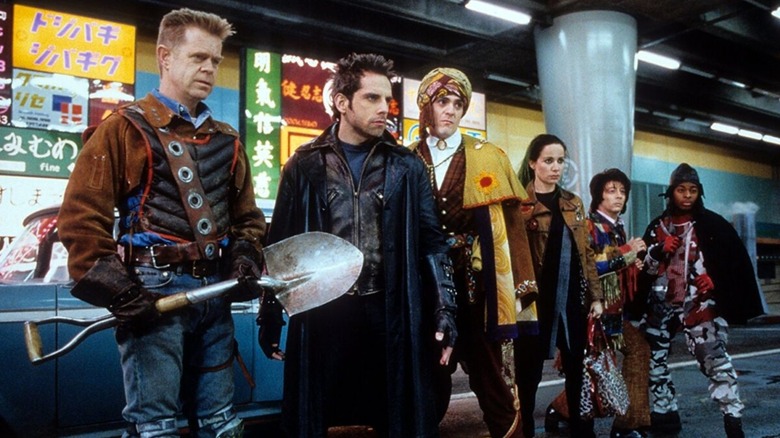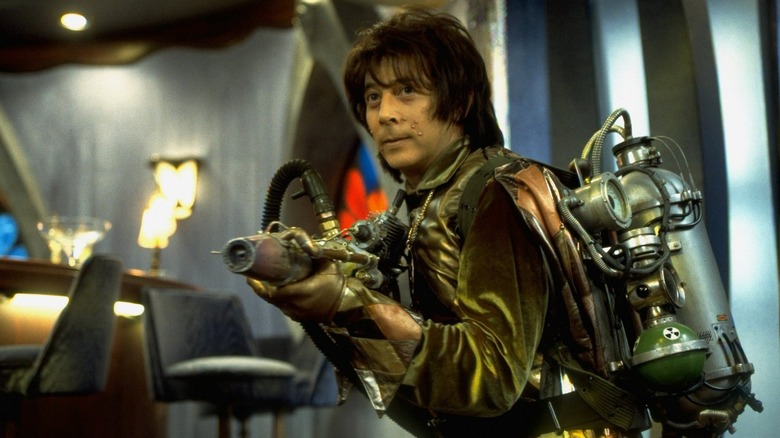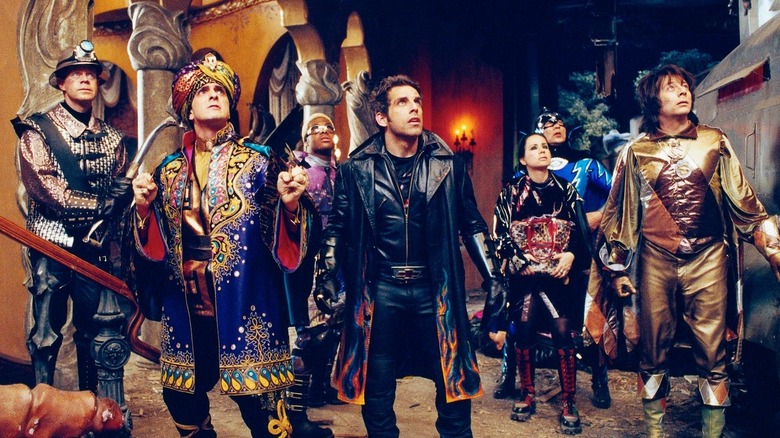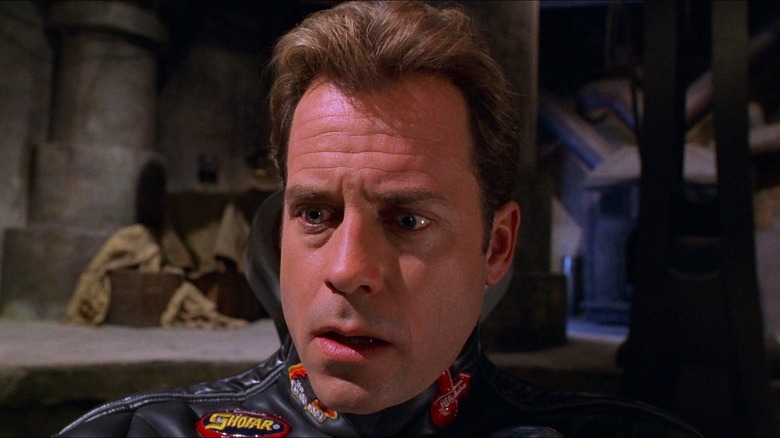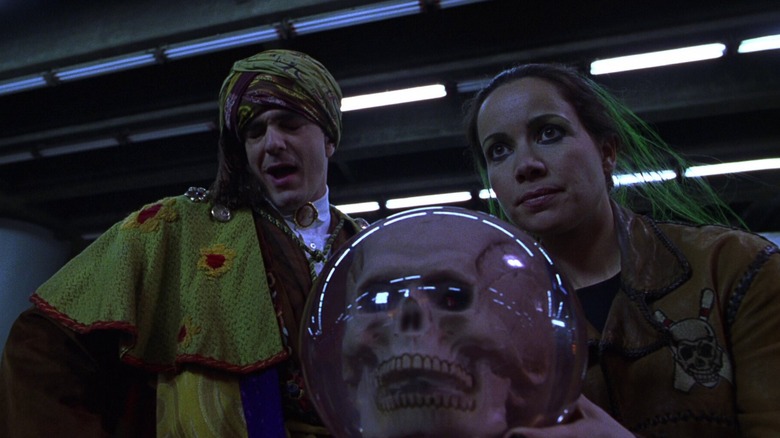Mystery Men Was The Best Riff On Superheroes Before Deadpool Made It Cool
When Tim Miller's superhero film "Deadpool" was released in 2016, it felt like a breath of fresh air. The Marvel Cinematic Universe was still standing astride the Earth like a mighty colossus, releasing gigantic hit films every few months. The MCU dominated the conversation like no other series of blockbusters before, generating so much online discourse that entire subgenres of journalism sprung up it its shadow. And the MCU's fans were passionately defensive, often accusing any naysayers or critics of hating fun and being ignorant to what great cinema looked like.
When "Deadpool" came out, the MCU was coming off "Avengers: Age of Ultron" and "Ant-Man," and was gearing up for "Captain America: Civil War." The MCU was in its stride. "Deadpool" sought to stick out his foot and trip the genre, hoping to cause a stumble. "Deadpool" was a crass, ultra-violent, obscenity-laced R-rated comedy which featured scenes of the title character (Ryan Reynolds) being stabbed in the head, sliced into pieces (sometimes at his own hand), or being pegged by his girlfriend Vanessa (Morena Baccarin).
More importantly, Deadpool would frequently break the fourth wall, addressing the audience and mocking the silly conceits of superhero comics and the movies based on them. It was a clever work of satire that came from within the corporate machine. The fact that Deadpool is about to be folded into the MCU with "Deadpool & Wolverine" is a testament to how badly "Deadpool" failed to truly deconstruct the superhero trend.
When it comes to superhero deconstruction, however, a film released 17 years before "Deadpool" was already doing it with verse, sarcasm, and an impeccably weird sense of humor. I refer, of course, to Kinka Usher's amazing 1999 film "Mystery Men," which is, without hyperbole, one of the best superhero films of all time.
The origin of Mystery Men
"Mystery Men" is based on supporting players from Bob Burden's "Flaming Carrot Comics," a series of surrealist superhero stories that began in 1984. The Flaming Carrot, as one might intuit from his name, had a five-foot flaming carrot for a head, but also wore swim fins and had a mysterious speaker implanted in his chest. The flaming Carrot shared an origin story with Don Quixote; namely, after marathon-reading 5,000 comic books, the reader assumed that he, too, was a superhero. Only, his hero persona was warped and strange. The Flaming Carrot ended up befriending the Mysterymen, a group that consisted of Screwball, Mr. Furious (who got so angry he became bulletproof), Bondo Man, and other oddballs.
In the 1980s, some comic book authors had grown tired of decades-old mainstream superhero tropes. Snarky satires began infiltrating comic book shops in earnest. By the 1990s, audiences had already enjoyed "The Tick," "Megaton Man," "Too Much Coffee Man," and many of their ilk. This was when the Teenage Mutant Ninja Turtles appeared. Superheroes, these comics rightly pointed out, aren't to be taken seriously. There is something fundamentally absurd about organized ranks of costumed vigilantes, and it was high time to tear them to shreds.
Those satirical attitudes made their way to film and television in the 1990s, a time when Gen-X had wearied of old-school 1980s media and self-satire became the decade's dominant tone. "The Tick" became an animated series, with shows like "Tattooed Teenage Alien Fighters from Beverly Hills," "Earthworm Jim," and "Freakazoid!" reaching the airwaves.
In 1999, it all came to a head with the release of "Mystery Men," a film about silly, unsuccessful B-list superheroes with weird powers and no fame. Heroism had been commercialized ... and they couldn't get a break.
Mystery Men is one of the best of all superhero movies
"Mystery Men" was, at its core, an anti-corporate narrative, treating superherodom like a crowded marketplace where indie heroes couldn't get a toehold. The Mystery Men lived in Champion City, which was overseen by the dazzling, smiling Captain Amazing (Greg Kinnear). The Captain was so well-loved that he wore corporate logos on his costume like a race car. He was so efficient, it became difficult for Mr. Furious (Ben Stiller), the Blue Raja (Hank Azaria), and the Shoveler (William H. Macy) to gain any credibility as vigilantes. It certainly didn't help that their powers were rage, flying silverware, and shovels, respectively.
Captain Amazing, it turns out, had run out of supervillains to fight, and deliberately released his arch-nemesis, Casanova Frankenstein (Geoffrey Rush) from a mental asylum as a publicity stunt. Casanova proved to be wilier than Amazing anticipated, and the hero was soon kidnapped and slated for execution via the villain's powerful death ray. It would fall to the Mystery Men to recruit new members and stage a rescue. Mr. Furious, the Blue Raja, and the Shoveler would soon be joined by the Invisible Boy (Kel Mitchell), who is only invisible when you're not looking, the Spleen (Paul Reubens), armed with magic farts, the Bowler (Janeanne Garofalo), armed with a magic bowling ball, and the Sphynx (Wes Studi), their sage-like leader.
Apart from possessing a strange premise, "Mystery Men" has a genuinely funny screenplay. The characters constantly throw off strange one-liners about the oddness of their ambitions. "I have something up my sleeve," Casanova says, "and I'm not just talking about the wart on my elbow." Later on, the earnest, po-faced Shoveler gets to intone, "We have a date with destiny. And it looks like she ordered the lobster."
Mystery Men shows that weirdos are the true heroes
In 2016, when "Deadpool" came out, it was difficult to find naysayers about superheroes. The Marvel films were all critical and financial hits, and everyone understood superhero lore and took it very seriously. "Mystery Men" came at a time when the public was just as ready to laugh at superheroes as with them. Throughout the 1990s, the only superhero that seemed to be granted mainstream acceptance was Batman. The other successful heroes, the Ninja Turtles, were a deliberate joke. Very occasionally, a very earnest superhero would come along — like, say, Captain Planet — and be laughed off the screen. Earnestness wasn't in vogue and irony was at the top of the list.
"Mystery Men" tapped into that irony, pointing out that outsiders and weirdos were probably more common than the Captain Amazings of the world. They were merely being suppressed by corporate interests ... and their own quirky ideas as to what might be successful; did the Blue Raja really think forks and spoons were effective crime fighting tools? It seems that sewing a costume, inventing an alter-ego, and orchestrating a visual "gimmick" were more important to superheroes than actual acts of heroism. And if that's the case, well, then superheroes are kind of shallow, aren't they?
But "Mystery Men" isn't exploring the fascist underpinnings of ego-driven super-beings like, say, "The Boys." It's exploring how weirdos are the true heroes. The people off to the side are, through gumption, passion, and strange interests, moving the machinery of the world.
The 1990s were when people deliberately sought to escape the mainstream, find their own niche, and become successful on their own terms. There was no call to be accepted by the mainstream commercial world.
Mystery Men tanked
Perhaps "Mystery Men," however, communicated its message too clearly. In being a semi-absurdist, anti-corporate, superhero media-dissecting screed, Kinka Usher's film seems to have alienated audiences. Made for a pretty big budget of $68 million, "Mystery Men" only grossed $33 million at the box office. Many critics weren't kind either, finding the film's central conceit to be unfunny or too weird for its own good.
It didn't help that the film spent so much money on its large celebrity cast and super over-designed sets; "Mystery Men" may have been satirizing commercial superhero films like "Batman Forever" and "Batman & Robin," but it looked no different in its overblown Atlantic City-style visuals. Usher, coming from TV commercials, made every shot busy and dynamic, often to a detriment. The aesthetic may be appealing in an over-the-top kind of way, but audiences didn't understand the blend of hyper-slick production value and whimsical, self-prodding humor. To date, it remains Usher's only feature film.
One could easily argue that "Mystery Men" was both of its time, but also ahead of its time. It was satirizing a superhero boom that hadn't come yet. It also possessed a lot of healthy Gen-X skepticism about superhero tropes, mocking both the broad ideas and the specifics (there's a funny conversation about how Captain Amazing couldn't have a glasses-wearing alter-ego because he wouldn't be able to see without his glasses).
"Deadpool" picked up the torch "Mystery Men" was holding in 1999 and ran with it. Deadpool then ran the torch through the front doors of mainstream appeal. "Mystery Men," perhaps fittingly, has remained on the outside, a cult classic only beloved by weirdos like me.
It's not a film for the heroes. This one is for the other guys.
Happy 25th anniversary.
